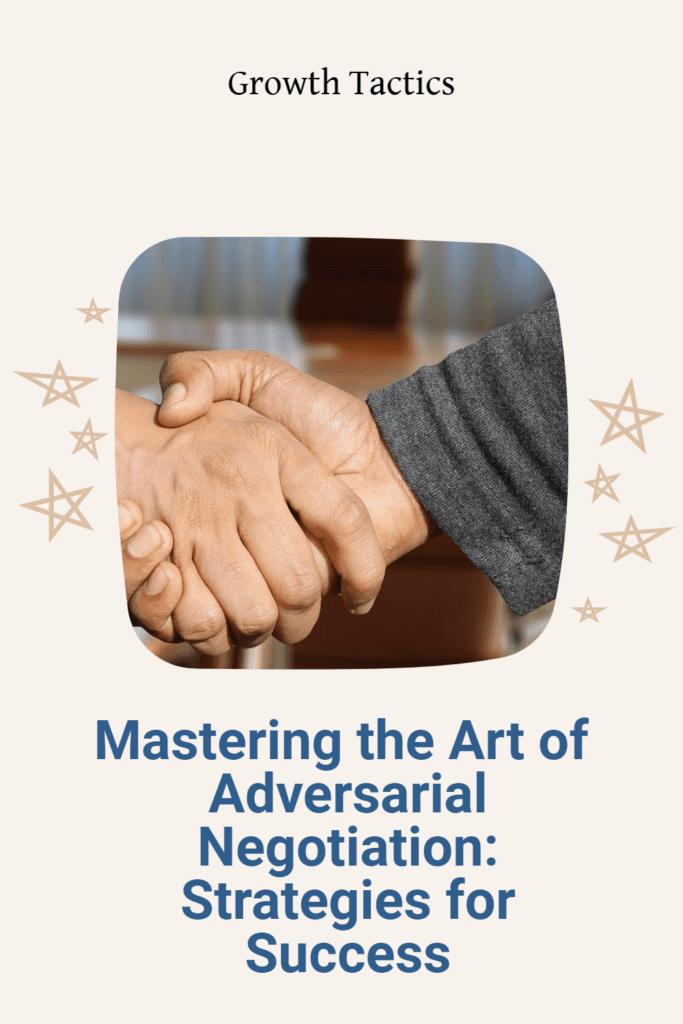Negotiation is an essential skill in both personal and professional settings. Whether you’re haggling over the price of a car or negotiating a business deal, understanding the different approaches to negotiation can greatly impact the outcome. One such approach is adversarial negotiation. In this blog post, we will delve into the world of adversarial negotiation, exploring its tactics, benefits, and strategies for success. If you’ve ever wondered how to navigate difficult negotiations and come out on top, this article is worth reading.
Jump To Section
The Basics of Adversarial Negotiation
Let’s start by defining what adversarial negotiation is. Adversarial negotiation is a type of negotiation style in which each party approaches the negotiation as a win-lose situation. The negotiators involved are focused on achieving their own objectives and are willing to use aggressive tactics to gain leverage. This approach can be highly effective in certain situations, such as when negotiating a job offer or in high-stakes business negotiations.
Unpacking Adversarial Negotiation: Tactics and Strategies
Now that we have a basic understanding of adversarial negotiation, let’s explore some of the key tactics and strategies that successful negotiators use in this approach.
1. The Power of Pretend
One of the tactics often employed in adversarial negotiation is the art of pretending. Adversarial negotiators may pretend to be less interested or willing to compromise than they actually are. By doing so, they gain an advantage by potentially lowering the other party’s expectations and increasing the likelihood of securing a more favorable outcome.
2. The Collaborative Bargaining Dance
Collaborative bargaining, despite its name, can be a powerful strategy in adversarial negotiations. By demonstrating a willingness to collaborate on certain issues, an adversarial negotiator can create goodwill and build trust with the other party. This can lead to more open communication and a greater chance of reaching a mutually beneficial agreement.
3. The Art of Concession
Concession is another tactic frequently employed in adversarial negotiation. By strategically conceding on certain points, negotiators can create a sense of goodwill and persuade the other party to reciprocate concessions. This can be particularly effective in situations where there are multiple issues to negotiate, allowing both sides to make trade-offs that ultimately lead to a better deal.
4. Building Relationships to Enhance Negotiating Power
Building relationships is essential in adversarial negotiations. While the overall approach may be competitive, establishing a foundation of trust and goodwill can greatly influence the negotiations. Negotiators who take the time to understand the other party’s needs and interests can find areas of common ground and work towards a mutually beneficial outcome.

The Pros and Cons of Adversarial Negotiation
Now that we have explored the tactics and strategies of adversarial negotiation, let’s take a closer look at its pros and cons. Like any approach to negotiation, there are advantages and disadvantages to consider when employing adversarial tactics.
The Pros
1. Empowers Assertiveness
One of the key benefits of adversarial negotiation is its ability to empower assertiveness. By adopting this approach, negotiators can confidently advocate for their interests and assert their position. This can be particularly useful in situations where there is little room for compromise or when negotiating with parties known for their aggressive tactics.
2. Creates Competitive Advantage
Adversarial negotiation can help create a competitive advantage in certain situations. By strategically employing aggressive tactics and leveraging concessions, negotiators can gain the upper hand and secure more favorable outcomes. This can be especially beneficial in high-stakes business negotiations where the stakes are high and every advantage counts.
3. Protects Interests
The adversarial approach allows negotiators to prioritize and protect their interests. By being assertive and focused on achieving their objectives, negotiators can ensure that their needs are met and their interests are not compromised. This can be particularly important when negotiating complex contracts or dealing with parties who may have differing priorities.
The Cons
1. Strains Relationships
One of the downsides of adversarial negotiation is that it can strain relationships. The aggressive tactics and win-lose mindset can create tension and animosity between the parties involved. This can have long-lasting effects on future negotiations and collaborations, as trust and goodwill are eroded.
2. Misses Opportunities for Collaboration
Adversarial negotiation puts a strong emphasis on individual gains and may overlook opportunities for collaboration and creative problem-solving. By focusing solely on winning and gaining an advantage, negotiators may fail to explore win-win solutions that could benefit all parties involved. This can ultimately limit the potential for long-term relationships and mutually beneficial outcomes.
3. Potential for Escalation
In some cases, adversarial negotiation tactics can lead to escalation and an impasse in the negotiation process. When both parties take an aggressive stance and refuse to make concessions, it becomes challenging to find common ground and reach a satisfactory agreement. This can result in a breakdown in communication and a failure to achieve desired outcomes.
Finding the Right Balance
As with any negotiation approach, it’s essential to find the right balance that aligns with your goals and the specific situation at hand. While adversarial negotiation may offer advantages in certain scenarios, it’s crucial to consider the potential downsides and adapt your approach accordingly.
By combining elements of adversarial negotiation with a collaborative mindset, you can create a hybrid approach that maximizes your chances of success. This approach allows you to assert your interests and utilize competitive tactics when necessary, while also considering opportunities for collaboration and long-term relationship building.
Comparing Adversarial Negotiation with Other Forms of Negotiation
In the world of negotiation, there are various approaches to consider. We’ve already explored adversarial negotiation in detail, but let’s take a moment to compare it with other forms of negotiation. Understanding the differences between these approaches can help you choose the right strategy for your specific situation. So, let’s dive in!
Adversarial Negotiation versus Collaborative Negotiation
Adversarial negotiation, as we know, is a win-lose approach where each party focuses on their own interests and employs aggressive tactics to gain an advantage. On the other hand, collaborative negotiation is a more cooperative and problem-solving approach. In collaborative negotiation, both parties work together to find mutually beneficial outcomes, aiming for a win-win situation.
While adversarial negotiation can be beneficial in certain scenarios, collaborative negotiation offers advantages such as:
- Opportunities for creative problem-solving and collaboration
- Maintaining relationships and trust even during challenging negotiations
- Long-term benefits through fostering partnerships and ongoing cooperation
Adversarial Negotiation versus Integrative Negotiation
Another form of negotiation is integrative negotiation, often referred to as “win-win” negotiation. In integrative negotiation, the focus is on expanding the proverbial pie, seeking solutions that satisfy the interests of all parties involved. This approach relies on open communication, sharing information, and exploring multiple options to create value.
Compared to adversarial negotiation, integrative negotiation offers:
- A more cooperative and less confrontational atmosphere
- A higher likelihood of reaching mutually beneficial agreements
- The potential to uncover creative solutions that go beyond initial expectations
Adversarial Negotiation versus Principled Negotiation
Principled negotiation, also known as interest-based negotiation or the Harvard Negotiation Project approach, takes a principled and objective stance. The focus is on separating the people from the problem and seeking solutions based on objective criteria rather than personal biases or aggressive tactics.
In contrast to adversarial negotiation, principled negotiation offers:
- A focus on common interests, emphasizing fairness and objective criteria
- The potential to generate options that satisfy both parties’ interests
- The opportunity to preserve relationships and build trust during negotiations
Choosing the Right Approach
When deciding on the best approach for your negotiations, consider the following factors:
- The Relationship: Is maintaining a positive long-term relationship with the other party important? Collaborative and principled negotiation may be more suitable in such cases.
- The Objectives: Are you primarily focused on protecting your interests and gaining a competitive advantage? Adversarial negotiation might be a suitable strategy.
- The Context: What is the nature of the negotiation? Is it a one-time transaction or an ongoing partnership? The context can influence the choice of negotiation approach.
Remember, there’s no one-size-fits-all approach to negotiation. The right strategy depends on the situation, the desired outcomes, and the dynamics between the parties involved. By understanding and being familiar with different negotiation approaches, you can adapt your strategy and maximize your chances of achieving your objectives.
So, the next time you find yourself in a negotiation, take a moment to assess the situation and choose the approach that aligns with your goals. Armed with knowledge and a flexible mindset, you’ll be well-prepared to navigate the negotiation landscape and secure successful outcomes.
Key Takeaways and Next Steps
Next time you find yourself in a negotiation, consider the approach you want to take. Adversarial negotiation can be a powerful tool when used strategically, but it’s important to weigh the potential benefits against the potential risks. Being aware of adversarial tactics can give you an advantage, regardless of the negotiation style you choose.
Remember, negotiation is an art form that can be honed with practice and knowledge. The more you learn and apply these strategies, the better equipped you will be to navigate the complex world of adversarial negotiation and achieve the outcomes you desire.


